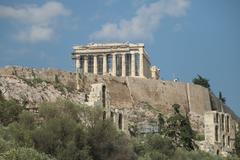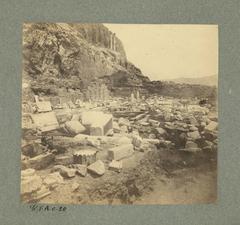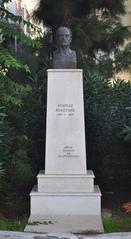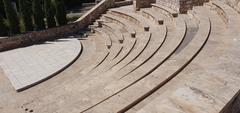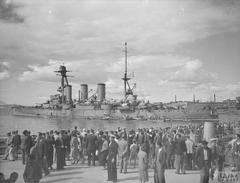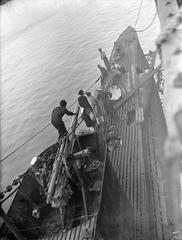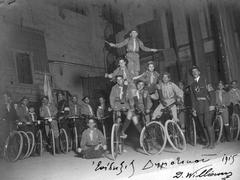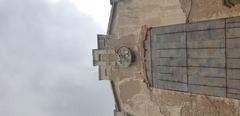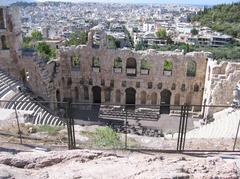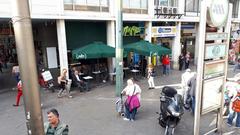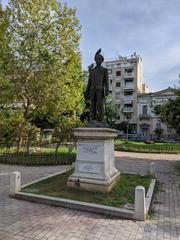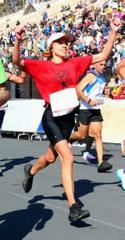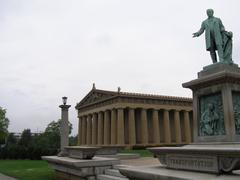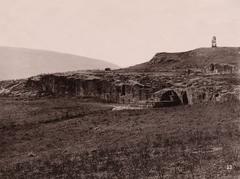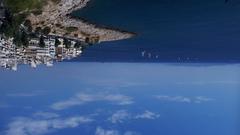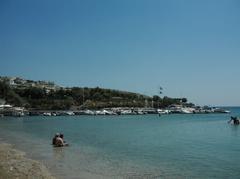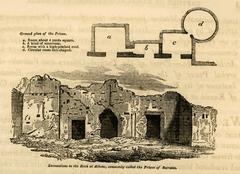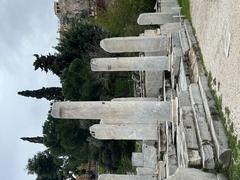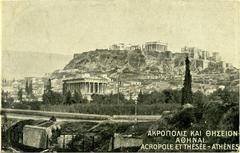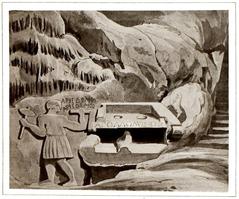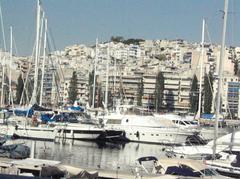National Resistance Monument Piraeus: Visiting Hours, Tickets, and Complete Travel Guide
Date: 14/06/2025
Introduction: History and Significance
Located in the bustling port city of Piraeus, Greece, the National Resistance Monument and the adjacent National Resistance Square serve as enduring testaments to the bravery and resilience of Greek resistance fighters during World War II. These landmarks are not just commemorative structures but vibrant focal points for civic pride, education, and cultural memory.
Piraeus, Athens’ historic gateway to the sea, has long been a pivotal site in Greek history. Its port has been central to trade, warfare, and cultural exchange since antiquity, shaped by figures such as Hippodamus of Miletus and chronicled by historians like Thucydides and Herodotus. Over centuries, Piraeus has undergone cycles of decline and resurgence, from ancient prominence to Ottoman-era obscurity, and then to modern revitalization after Greek independence (overyourplace.com, audiala.com, piraeus.org).
The National Resistance Monument, situated near the harbor’s waterfront promenade, features a striking bronze statue of the winged goddess Nike—representing victory and freedom. National Resistance Square (formerly Korai Square) is a landscaped civic space that honors wartime heroism and hosts commemorative and cultural events (lonelyplanet.com, audiala.com).
This guide provides essential information on visiting hours, accessibility, historical background, and practical tips for experiencing the National Resistance Monument and Square—an ideal starting point for exploring Piraeus’s layered past and vibrant present (piraeus.gov.gr, visitgreece.gr).
Table of Contents
- Introduction
- Historical Context
- Visiting Information
- Cultural and Educational Significance
- Nearby Attractions
- Practical Visitor Information
- FAQ
- Conclusion
- References
Historical Context
Ancient and Strategic Foundations
Piraeus has served as Athens’ principal port since antiquity, its urban design attributed to Hippodamus of Miletus. The city’s layout, connected to Athens by the Long Walls, enabled it to become an economic and military powerhouse. Ancient historians such as Thucydides and Herodotus highlighted Piraeus’s role during the Persian and Peloponnesian Wars. Remnants of ancient shipyards and fortifications can still be seen, especially near Zea Marina (overyourplace.com, audiala.com, thecrazytourist.com).
Ottoman Decline and 19th-Century Revival
The city declined under Ottoman rule, with its port falling into disrepair. Following the Greek War of Independence, Piraeus was re-founded in 1835, and modern urban planning efforts led to the revitalization of communal spaces, including the area now known as National Resistance Square (audiala.com, piraeus.org).
Piraeus in the 20th Century: War, Occupation, and Resistance
The 20th century saw rapid growth, but World War II brought devastation. As a strategic port, Piraeus endured heavy bombing and occupation, leading to widespread hardship. The local population played a crucial role in sabotage and resistance against Axis forces, actions commemorated by monuments and annual ceremonies (audiala.com).
Creation and Symbolism of the National Resistance Monument and Square
After WWII, the former Korai Square was renamed National Resistance Square to honor those who fought against the occupation. The square’s central monument—a bronze statue of Nike—serves as a powerful symbol of defiance and hope (audiala.com).
Visiting Information
Hours and Admission
- Open 24/7: The National Resistance Monument and Square are accessible year-round, at all times.
- No Admission Fee: Entry is free; no tickets are required.
Location and Transportation
- Address: Intersection of Akti Miaouli and 2nd Merarchias Street, near the port (Google Maps).
- By Metro: Piraeus Metro Station (Line 1) is about 500 meters away, with direct links to Athens (Athens Transport).
- By Bus: Multiple lines (e.g., 040, 049) stop nearby.
- By Ferry: Convenient for arrivals by ferry and cruise ships.
- By Car: Limited parking; public transport is recommended.
The area is pedestrian-friendly, with wide sidewalks and clear bilingual signage.
Accessibility
- Fully Accessible: Paved paths and ramps ensure easy access for wheelchairs and strollers.
- Urban Environment: Some sidewalks may be narrow or uneven, so caution is advised.
Visitor Tips and Guided Tours
- Best Times: Early morning or late afternoon for optimal lighting and fewer crowds.
- Guided Tours: Many local agencies and online platforms offer tours that include the monument and other historical sites (Athens Walking Tours, Discover Greece).
- Photography: Welcome at any time; drones require permission (Hellenic Civil Aviation Authority).
Cultural and Educational Significance
National Resistance Square and the monument are not only places of remembrance but also active sites for civic and educational engagement. Schools regularly organize visits, and annual commemorations on national holidays—like Ohi Day (October 28) and Victory Day (May 9)—feature wreath-laying, music, and speeches. Informational plaques provide historical context, and the plaza frequently hosts cultural activities (audiala.com, piraeus.gov.gr).
Nearby Historical Sites and Attractions
Within walking distance, visitors can explore:
- Archaeological Museum of Piraeus (Archaeological Museum of Piraeus)
- Municipal Theatre of Piraeus (Piraeus Municipal Theatre)
- Hellenic Maritime Museum
- Marina Zeas (Pasalimani)
- Piraiki Waterfront (great for seafood and harbor views)
These attractions offer a fuller picture of Piraeus’s ancient, maritime, and cultural heritage (Discover Greece).
Practical Visitor Information
- Amenities: No on-site facilities, but many cafés, restaurants, and public restrooms are nearby.
- Safety: The area is generally safe, but exercise standard precautions, especially with personal belongings.
- Language: Most plaques are in Greek; translation apps or guided tours can enhance understanding.
Frequently Asked Questions (FAQ)
Q: What are the visiting hours?
A: Open 24 hours, every day.
Q: Is there an admission fee or need for tickets?
A: No, the site is free and ticketless.
Q: Is the monument accessible for those with mobility challenges?
A: Yes, the area is wheelchair and stroller friendly.
Q: Are there guided tours?
A: Yes, several tours include the monument and offer historical context (Athens Walking Tours).
Q: Can I take photos?
A: Yes, photography is allowed. Drones need prior authorization.
Q: Are there events or ceremonies?
A: Yes, especially on national holidays, which may affect access temporarily (Greek City Times).
Conclusion
The National Resistance Monument and Square in Piraeus are powerful symbols of the city’s—and the nation’s—courage and unity. Their open, accessible design encourages reflection, remembrance, and active community engagement. With no admission fee, proximity to major historical and cultural attractions, and regular commemorative events, these sites are essential for anyone seeking insight into Greek history.
For the most rewarding visit, consider spring or autumn for pleasant weather, combine your stop with other local museums and the port, and use official resources or guided tours for deeper historical context. Make the most of digital resources like the Audiala app for guided audio tours and up-to-date event information (audiala.com).
References
- https://audiala.com/en/greece/piraeus/kotzia-square
- https://www.piraeus.gov.gr
- https://www.discovergreece.com/travel-ideas/best-of/10-best-things-do-piraeus
- https://www.athenswalkingtours.gr/
- https://overyourplace.com/piraeus-culture-history-traditions-and-festivals-guide/
- https://www.piraeus.org/history.html
- https://www.thecrazytourist.com/15-best-things-to-do-in-piraeus-greece/
- https://www.lonelyplanet.com/articles/perfect-day-piraeus-athens
- https://www.visitgreece.gr
